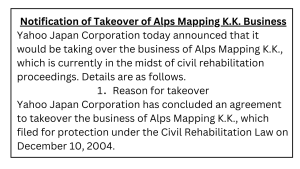
As its sales increased, Alps had financed its growing working capital needs by borrowing from banks. But no bank wanted to be a “main bank” for a small unlisted company any more. So every year or so we added another bank lending us 200 million yen or more, until we had something like six or seven different banks. All of these loans were short-term, and had to be “rolled over” each year.
As long as all the banks rolled over their loans each year, and we were able to find a new bank when we needed it, to the board, everything seemed fine.
But the reality of the book business was that publishers of map books did not really “sell” their books to book wholesalers outright. Publishers actually sold almost all of their books on a sort of consignment basis. In this system, Alps booked revenues when they passed the books to wholesalers and bookstores, and a booked reserve for the percentage of books that historically had been returned unsold, assuming it would remain roughly at the same level.
It took a long time for books to return unsold, – that is, for us to know that they were not selling. When the actual percentage of returned books increased, the amount became larger than our reserve, and we had to start reversing (reducing) our accounting revenues by the excess amount.
This situation scared the board, which suddenly then asked me to ask Yahoo if they still wanted to buy the company. Yahoo of course replied that it had no interest to buy the company at that time. Alps had told them “no” once before. Why had it suddenly changed its mind? They could easily guess that the company was in financial trouble, and could anticipate what would happen next.
One of the banks refused to roll over its loan. Alps could not find a replacement lender.
Alps was suddenly forced to declare bankruptcy, wiping out stockholders’ equity and the banks’ loans. Alps had to immediately look for a “sponsor” under the “minji-saisei” (civil rehabilitation) system. The company that immediately stepped up with great interest to be the sponsor of Alps, of course, was Yahoo. There had been few very logical buyers in the first place, something that had always bothered me. In M&A, you need (a) remaining value and (b) competition between buyers, to do a good deal. No matter how hard I tried, I had been unable to communicate this reality to diligent map experts who did not understand M&A transactions.
Yahoo immediately became the sponsor, thereby acquiring all of Alps valuable map data, its domain knowledge, and its employee contracts, for a price of zero Yen… and without having to take on any debt at all.

The moral of the story? Most Japanese companies and their boards tend to avoid selling non-performing business units, subsidiaries – or the whole company – until far too late in time. Executives and even other outside board members often feel it is somehow disloyal to not give the business a bit more time, or to move quickly to “sell” their employees. But in M&A, if you do not move fast to sell a division or a company while it still has value, you often discover later on that there is very little value left, and very few interested buyers. “Very few interested buyers” almost guarantees that you will only get a low price, if you can sell the company at all. As a director, I should have fought even harder to explain this. Actually, I thought I was fighting hard, but at the time, I had no war stories like this one to tell.
Another lesson is that it can be worth it to pay higher interest for long-term debt from a main bank that might help you convince the board because it has a larger amount at stake…and conversely, if you cannot find a long-term lender like that, you should be worried. Last, MapInfo was not as helpful as I would have liked, because if anything they wanted to delay booking a loss.
Nicholas Benes
(writing in his personal capacity and not representing any organization).
—————————————————–
If you thought this post was helpful, here are many other posts in this series, which will continue! Please come back for more.
Outside Director Lessons #11: Committees Need Rules(click)
Outside Director Lessons #10: Directors Set Direction(click)
Outside Director Lessons #9: Appointing the CEO(click)
Outside Director Lessons #8: The Role of the Board(click)
Outside Director Lessons #7: If No D&O…Get It Yourself(click)
Outside Director Lessons #6: Insist on Total Independence!(click)
Outside Director Lessons #5: Being a Whistleblower Hotline(click)
Outside Director Lessons #4: What is Worse Than the Company Going Under?(click)
Outside Director Lessons #3: How Suddenly Companies Can Collapse! (click)
Outside Director Lessons #2: My First Experience as an Outside Director (click)
Also, kindly please read the post below, consider making a donation(click) to BDTI so we can keep contributing to good governance, Japan’s future, and sustainability… and share these posts widely!
Outside Director Lessons #1: Genesis of Director Training Nonprofit BDTI(below)
On 4/16/2023 I became 67 years old. On this “occasion” I would like to ask you to consider donating to The Board Director Training Institute of Japan (BDTI), which I have led in offering director training in Japan for almost 14 years now, training about 3,000 persons in our programs, and many more via e-Learning. At the same time, going forward, I also will attempt to make a series of posts (on this discussion forum) giving a perspective or story related to corporate governance, based on recent events and/or my own 15 years of experience sitting on boards here (or the experiences of people I know), that will be light, easy reading but hopefully also be thought-provoking.
BDTI’s work is “missionary work” that requires passion and commitment. Perhaps these stories will be of interest in terms of revealing why I do what I do, the challenges that face Japan and its companies and investors, and how they can be overcome.
Because Japan does not have a customary or mandatory requirement for serious director training, BDTI’s courses need to be “subsidized” in some way so that we can offer high-quality programs at a price point that is low enough to attract our (overly frugal) customers, –that is to say, at prices that on a per-person-per-hour basis are one-third of less than in other developed markets. (Even paying low salaries and donating a lot myself, this is the market reality). Moreover, “G” is the foundation on which the “house of ESG” is built, but that fact is not as widely recognized as it should be.
We “subsidize” and lower our prices in three ways: 1) first, by skimping on all expenses at a small office in the suburbs of Tokyo; 2) second, by receiving donations from individuals and institutional investors who think it is important to improve the effectiveness and trustworthiness of corporate governance in Japan; and 3) third, by collecting and normalizing a long-term “big data” structured database of information (including text), and selling access to it to large fund managers, including large quantitative funds.
At long last, Japanese institutional investors are now considering to support us, but this will take a bit more time…so we need your help, even if it is just a few thousand Yen.
BDTI’s Update and Plans for FY2023: https://blog.bdti.or.jp/en/2023/03/27/fy2023/ – This contains the most recent information, concisely.
BDTI’s Training Programs: Best to look at: https://bdti.or.jp/director-training/ using Google Translate.
To Donate:
https://bdti.or.jp/en/about/make-a-donation/
Please share this post widely !!!
Thank you,
Nicholas Benes
Representative Director, The Board Director Training Institute of Japan

Comments